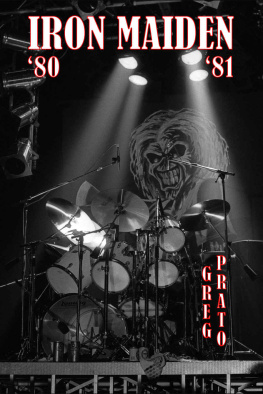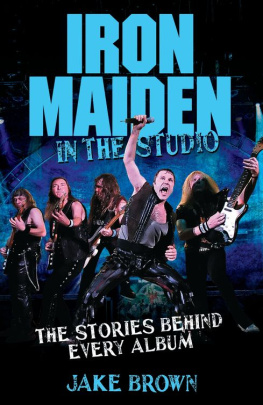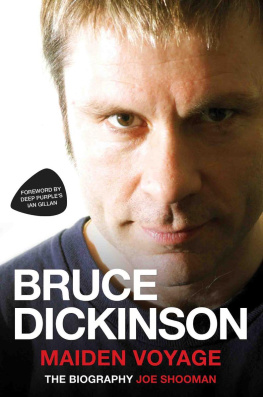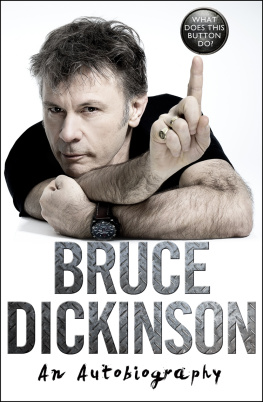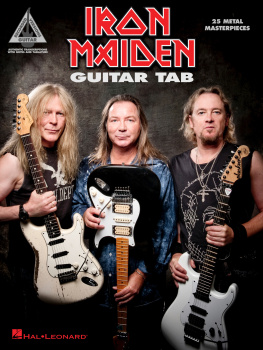IRON MAIDEN
'80 '81
BY GREG PRATO
Written by Greg Prato
Printed and distributed by Greg Prato Writer, Corp
Published by Greg Prato Writer, Corp
Front cover photo by Harry Potts
Front cover design by Greg Prato
Copyright 2015, Greg Prato Writer, Corp. All rights reserved.
First Edition, March 2015
All rights reserved. No part of this book may be reproduced in any form or by any electronic or mechanical means, including information storage or retrieval systems, without permission in writing from the publisher.
INTRODUCTION
Like most people I know (and even quite a few interviewed for this bloody book), the first time I heard the music of Iron Maiden, Bruce Dickinson was their singer - as it was a case of me being too darn young at the time to have been aware of the band when Paul Di'Anno fronted them. And while I still fancy some Dickinson-era albums to this day (particularly 'The Number of the Beast'), I can honestly say that the Maiden music I listen to and enjoy the most are the releases back when Di'Anno was the man out front. And as I've gotten older, I've realized what made that line-up so darn special - they were very original both musically and visually.
Musically, early Maiden was a merger of punk and metal - to the best of my knowledge, one of the first bands bold enough to do so. In fact, you could say that Di'Anno-era Maiden specialized in "punk metal" ("Prowler," "Running Free," "Wrathchild," etc.), while Dickinson-era Maiden specialized in "prog metal" ("Rime of the Ancient Mariner," "Alexander the Great," "Seventh Son of a Seventh Son," etc.). And at the time, if you were a metallist, long hair was a must. But this wasn't the case with Mr. Di'Anno - he fancied punk rock, so it made sense that he would have short hair. Admittedly, a few other metal frontmen went the "short hair route" (Rob Halford, Udo Dirkschneider, Graham Bonnet, and Angry Anderson immediately come to mind), but longhaired gentlemen far out-numbered shorthaired gentlemen within the realm of heavy metal back in the '80s.
While I've gone through stages of appreciating Maiden over the years, it was an unfortunate event that would kick off an intense Maiden-listening phase for yours truly - when the drummer of their early albums, the great Clive Burr, passed away on March 12, 2013. I penned an article about Burr for the Rolling Stone site that was published a day later, and in doing so, I put early Maiden on "repeat" on my iPod to get me in the right frame of mind to pen the articleand I kept listening and listening - far beyond the article's publication date.
In addition to writing for sites and mags, I am also the author of quite a few books, and all of the books I have penned to this point have been on subjects that as an admirer/fan, I wanted to read about, but there was no book on the market that zeroed precisely in on it. I know there have been quite a few Maiden books issued over the years, but none focused solely on the years 1980 and 1981, when the band was rapidly becoming one of the world's top rock bands.
By 2014, I figured the time was right to finally put together a book about Maiden's "Di'Anno years," and in doing so, was able to conduct quite a few interviews that are exclusive to this book, including past Maiden members, fellow musicians, fans, and even the producer of their debut album. So, if I may offer a suggestion at this point - you should locate your early Maiden albums, hit play, and away we goback to '80/'81.
Iron Maiden's gonna get you!
Greg Prato
p.s. Questions? Comments? Feel free to email me at gregprato@yahoo.com.
CAST OF CHARACTERS
Charlie Benante - Anthrax drummer
Biff Byford - Saxon singer
Richard Christy - Death and Iced Earth drummer
Paul Di'Anno - Iron Maiden singer, 1978-1981
Udo Dirkschneider - Former Accept singer
Doro - Doro singer
David Ellefson - Megadeth bassist
Anders Fridn - In Flames singer
John Gallagher - Raven singer/bassist
Jean-Paul Gaster - Clutch drummer
Scott Ian - Anthrax guitarist
Martin Levan - 'Iron Maiden' album engineer
Herman Li - DragonForce guitarist
Lips - Anvil singer/guitarist
Dave Lombardo - Former Slayer drummer
Wil Malone - 'Iron Maiden' album producer
Kim McAuliffe - Girlschool singer/guitarist
Tony Platt - "Women in Uniform" / "Invasion" / "Phantom of the Opera" (live) single producer
Mike Portnoy - Former Dream Theater drummer
Dennis Stratton - Iron Maiden guitarist, 1979-1980
Brian Tatler - Diamond Head guitarist
Glenn Tipton - Judas Priest guitarist
Chris Troy - Praying Mantis bassist
Eddie Trunk - 'That Metal Show' co-host, radio DJ
Jeff Waters - Annihilator guitarist
Pete Way - Former UFO bassist
Robb Weir - Tygers of Pan Tang guitarist
CONTENTS
Chapter 1: NWOBHM
Chapter 2: Beginnings
Chapter 3: 'Iron Maiden' Track By Track With Paul Di'Anno
Chapter 4: 'Iron Maiden'
Chapter 5: 'Iron Maiden' Tour
Chapter 6: "Women in Uniform"
Chapter 7: Exit Dennis/Enter Adrian
Chapter 8: 'Killers' Track By Track With Paul Di'Anno
Chapter 9: 'Killers'
Chapter 10: 'Killers' Tour + 'Maiden Japan'
Chapter 11: Exit Paul/Enter Bruce
Chapter 12: What If Paul Stayed?
Chapter 13: Vocals
Chapter 14: Guitars
Chapter 15: Bass
Chapter 16: Drums
Chapter 17: Eddie/Derek Riggs' Artwork
Chapter 18: Influence On Others
Chapter 19: Maiden Memories
Chapter 20: Clive Remembered
Chapter 21: Holds Up?
Chapter 22: Discography
CHAPTER 1
NWOBHM
For the most part, North American-based rock/metal acts that hit the scene during the late '70s/early '80s were quite melodious and heavily produced. This was not the case over in England, where a group of bands categorized as the "New Wave of British Heavy Metal" preferred it raw n' rockin'.
ROBB WEIR [Tygers of Pan Tang guitarist]: I really don't think it was difficult [to be a metal band in the UK during the late '70s]. I think it's a lot more difficult now. Everybody was hungry for music. Heavy industry in the UK was thriving - we had shipyards, we had coalmines. And there were a lot of people that wanted on a Friday night to put their dirty boots outside the backdoor, come in and have a bath, and look forward to going out and seeing one of these hard rock/heavy metal bands, which belonged to this whole new kind of scene - the New Wave of British Heavy Metal. You'd put your leather jacket on or your denim jacket with its patches of your favorite bands, and thanks to Motrhead, you'd put your gun belt on! Because Motrhead was one of those funny bands that were kind of almost punk, but like, "heavy punk," if you'd like. Lemmy was kind of into punk - he taught the Sex Pistols' bass player [Sid Vicious] how to play bass, for God's sake! So they were sort of "running alongside" the New Wave of British Heavy Metal - but never really classed as that. I think they were probably a little bitwell, they were mid '70s, that Lemmy was putting that whole Motrhead thing together after Hawkwind.
GLENN TIPTON [Judas Priest guitarist]: I don't think I could have forecast that, as foreseeing it as such [that a new crop of British metal bands were up and coming]. But you do get a sort of feeling it might happen. You get a surge and you feel like you're part of that surge and you can feel momentum building up - like something's going to happen. I think you do get the feeling, but you're not really sure what.
JOHN GALLAGHER [Raven singer/bassist]: The term ["New Wave of British Heavy Metal"] was coined by Geoff Barton in Sounds Magazine, which was a weekly rag that came out for music, which was one of the better papers. And he was a big metal fan. There was famously a picture of Ritchie Blackmore smashing his Strat, and it had the word "Kerrang!" written on it, and of course, that turned into the magazine title later on. But he coined the phrase the "New Wave of British Heavy Metal," because he was down in the London area, and there were a number of bands - like Iron Maiden, Samson, and whoever were out there playing music. And that was happening all over the country. Totally insular. We were up in Newcastle - nowhere near London. It might have been Mars as far as we were concerned. And there were a bunch of like-minded kids all over the country, who hated punk, hated new wave, loved all the Deep Purples, the Zeppelins, the Sabbaths, and took that, and put some extra energy into it, and created their own music. That's why all those initial bands sound totally differentbut, they have the energy.
Next page
